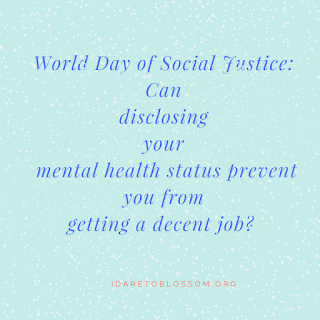WORLD DAY OF SOCIAL JUSTICE: Can Disclosing Your Mental Health Status Prevent You From Getting A Decent Job?
 February 20th, is the Day celebrated as World Day of Social Justice. As I read through un.org and scanned through social media, I kept asking myself, what does a day like this mean to persons managing their mental health? What difference does it make to them?
February 20th, is the Day celebrated as World Day of Social Justice. As I read through un.org and scanned through social media, I kept asking myself, what does a day like this mean to persons managing their mental health? What difference does it make to them?
The theme for this year’s World Day of Social Justice is “Preventing conflict and sustaining peace through decent work”.
It is my firm believe that for the mentally ill to effectively manage their mental health in Nigeria and be given an equal opportunity to thrive in the society, there must be mutual platforms for them to access decent work opportunities that support them without the fear of the stigma or prejudice that is currently associated with mental health issues in Nigeria.
Whether we like to admit it or not, the truth is, every day, a portion of the population is consumed by the prevailing economic distress. Some are coping well, others are trying to forge ahead with what is available to them, yet another set is falling into depression and have to seek medical attention. Even before this phase of economic distress, people still fall mentally ill as a result of poorly managed stress or issues rising from their genetic heritage. So there is a reasonable amount of people admitted into the few Neuro-Psychiatry hospitals available in Nigeria.
My question is, when they are discharged, and are stable, ready to contribute their quota to the society, will they be able to access decent work? Will the working conditions be conducive for their mental well-being? Will they be discriminated, labelled and disregarded?
I am one of the few persons, who fell mentally ill, was admitted in a Neuro-Psychiatry hospital, spent about 7 months in recovery, went back to the University, got a degree, and…. Got a job! Yes, I got a job. I was excited, even though it seemed stressful to me at that time and I was so afraid to disclose my mental health status to my employer. By the time I got my third job, somehow, I summoned courage to disclose to my employer, and I was amazed at the support I received. I was not regarded as weak or unstable, I was rather given more tasks and told, I was a strong person who was resilient and tenacious. I executed my assigned task with enthusiasm, asked questions when I needed to, and took a ‘no’, as an opportunity to learn and grow.
Persons managing mental health issues deserve a reliable source of livelihood from decent work, especially in a country like Nigeria, where there are no bills passed or laws actively executed to protect the rights of the mentally ill. As employees, mental health survivors are effective, creative and committed at their work. They cherish the opportunity to contribute meaningfully to society knowing that, life is offering them another chance to repurpose themselves.
Dear mental health survivor, if the world fails to recognise your value or fail to create opportunities for you to access decent work in your environment, understand that, you can create decent work for yourself. Try to volunteer your services, be a solution to a problem in your community, develop yourself in handcrafts, read books, and listen to the news with a mind full of optimism not pessimism.
Start with that positive thing you can do without necessarily incurring any debt. It may look small, but if you nurture it, it can blossom into a reliable source of livelihood for you and others who would come to identify with you.
My name is Precious, I was Bipolar and I live a full life.
Reference: http://www.un.org/en/events/socialjusticeday/


